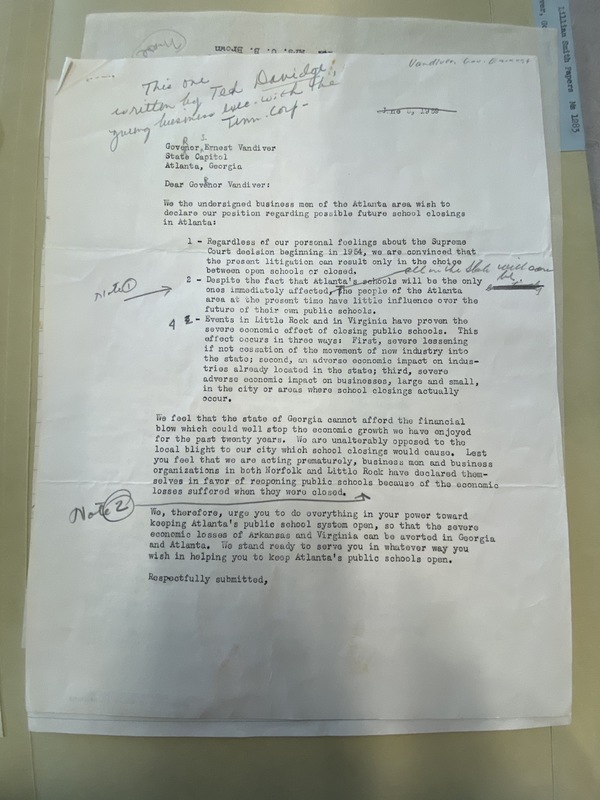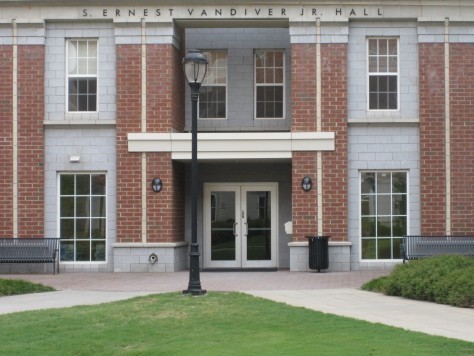Vandiver Hall
A dedication ceremony was held Sept. 26, 2009 to officially name a student residence hall at the University of Georgia in honor of former Gov. Ernest Vandiver. Speakers for the ceremony included former UGA President Michael F. Adams and Vandiver’s daughter, Jane Kidd of Athens. The University System of Georgia Board of Regents gave UGA permission to name the residence hall for Vandiver to recognize his contributions to higher education in Georgia and their support for UGA. Vandiver, who died in 2005, was governor of Georgia from 1959 to 1963. A native of Lavonia, he received degrees in business and law from UGA. During his administration, state funding for public higher education rose 29 percent. UGA received state appropriations for several residence halls and other major buildings including the physics, biological sciences, chemistry, geography/geology, and poultry science buildings as well as the pharmacy building and Stegeman Coliseum. However, Vandiver’s lasting legacy is his leadership in keeping UGA open in the face of efforts by other state leaders to close the school rather than accept racial integration in 1961.

Special Collections Document: Georgia businessmen urge Governor Vandiver to keep public schools open to protect Georgia's economy
Found in the Special Collections, this is a telegram sent to Governor Vandiver by Georgia businessmen urging him to keep public schools open. Closing public schools can severely hurt the economy of Georgia, and therefore, it was in the interest of Georgia businessmen to keep the schools open.
In 1959 U.S. District Court judge Frank Hooper ruled Atlanta's segregated public school system unconstitutional and ordered it integrated. Hooper, however, delayed the implementation of the order for one year to give state authorities time to develop a desegregation plan. This decision presented a problem to state leaders who, after the 1954 Brown v. Board of Education decision, had determinedly resisted desegregation by passing measures designed to fight the integration of Georgia's schools, including a constitutional amendment forcing the governor to cut off state funding to any school that desegregated. As the governor struggled with the decision of either effectively closing the public school system or implementing the widely unpopular option of desegregation, Bell developed the idea of putting the question to Georgia's citizens, thus having them, in effect, make the decision for Vandiver.
Before the legislature had a chance to vote, however, a new crisis forced Vandiver to make a decision regarding segregation. In January 1961 a federal judge ordered that two black students, Hamilton Holmes and Charlayne Hunter, be admitted to the University of Georgia. Citing state law, Vandiver issued a statement ordering the university closed. The next day, a federal judge reversed the governor's decision, creating the potential for a showdown between the state and federal governments. (The university did not actually close since Vandiver never signed the closure order and university president O. C. Aderhold never received official word from the governor's office to close the school.)
Choosing to avoid further confrontation with the federal government, Vandiver backed away from massive resistance and, in a speech before the assembly on January 18, introduced a bill that repealed laws designed to cut off funds for both the university and public schools, and that also adopted the recommendations of the Sibley Commission. The bill passed on January 31, and the Atlanta school system officially desegregated the following autumn. Although the Sibley Commission helped to prevent the violence that accompanied desegregation in other Deep South states, it also provided tactics that local school boards could use to slow down the desegregation process. As a result, serious attempts at desegregation across the state would not begin until the late 1960s.
Video clip of the press conference regarding the January 11th riot at the University of Georgia
The clip begins with a January 12 press conference during which reporters question Governor Ernest Vandiver about a January 11 riot at the University of Georgia. The clip begins with a January 12 press conference during which reporters question governor Ernest Vandiver about a January 11 riot at the University of Georgia. Governor Vandiver reads from a previously issued statement, detailing his reaction to riot events. He cites a memorandum from Colonel William P. Trotter, director of the state Department of Public Safety, regarding details of the evening, as well as a statement by mayor Snow reporting a return to order in Athens. Vandiver says there had been no prior plans for dealing with any potential disturbances. In response, a reporter quotes mayor Snow of Athens who says he warned Colonel Trotter of potential violence.
African American students Charlayne Hunter and Hamilton Holmes first applied to the University of Georgia in the summer of 1959 but were denied, according to the university, based on lack of space. After several other unsuccessful applications, lawyers Donald Hollowell, Horace T. Ward, and Constance B. Motley filed a federal lawsuit against the university on behalf of the students. On January 6, 1961, federal judge William A. Bootle ordered the university to admit the students and to stop rejecting applicants solely based on race. Governor Vandiver and state officials responded by citing the 1956 appropriations act preventing the state from funding integrated schools. Judge Bootle issued a temporary restraining order against Vandiver on January 10 preventing him from cutting off university funding and on January 13 declared the appropriations act unconstitutional. After a basketball game the evening of January 11 in which the University of Georgia lost to Georgia Institute of Technology, students rioted outside of Myers Hall, the dormitory where Hunter lived. The university suspended Hunter and Holmes "for their own protection" and sent them back to Atlanta that evening. Judge Bootle ordered the students readmitted January 13, and they returned to campus on January 16.
Youtube clip from the night of David Braun's death (link in description below)
https://www.youtube.com/watch?v=TdFQKP_7PBU
UGA police found David Braun on campus in his Vandiver Hall room on January 14, 2014, after police met a locked door to his room and went in using a key. The deceased student’s suitemate Tevin Reeves said he alerted housing officials after he had not seen David Braun since January 10. Reeves said he had smelled something coming from his suitemate’s room, which led him to report his concern. The Georgia Bureau of Investigation Medical Examiner’s Office and the Athens-Clarke County Coroner’s Office concluded that David Braun, 21, ingested a “lethal dose of fentanyl,” UGA police said in a press release, which led to his accidental death.
Works Cited
Biographical Questionnaires, Georgia Historical and Statistical Register, RG 4-10-74, Georgia Archives. "Vandiver, Ernest." Georgia Archives. 1960, http://cdm.georgiaarchives.org:2011/cdm/singleitem/collection/adhoc/id/2688.
WSB-TV (Television station : Atlanta, Ga.). "Governor Vandiver Speaks Against Integration." Walter J. Brown Media Archives and Peabody Awards Collection. 1961-01-18, http://dlg.galileo.usg.edu/news/do:wsbn42303.

